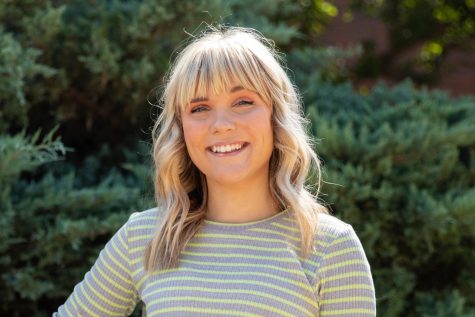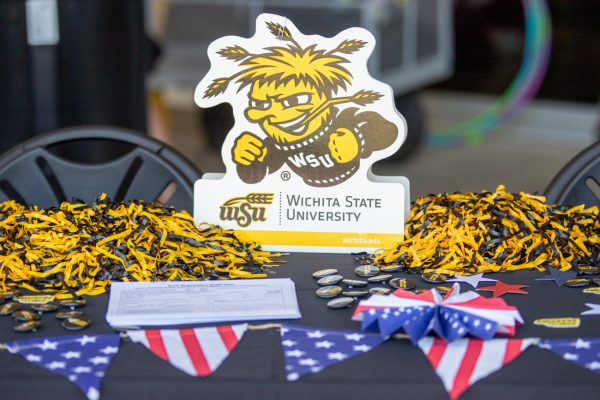New American Sign Language major to be offered next year
Liberal arts and sciences dean Andrew Hippisley speaks at the rededication of Fiske Hall on May 3, 2019.
The biggest college at Wichita State just got a little bigger. The College of Liberal Arts and Sciences will start providing a major in American Sign Language next year.
Currently, ASL is offered as a minor through communication sciences and disorders. Now, it will not only be a major but it will also be provided as a classical modern language.
This is what it should be taught as, LAS Dean Andrew Hippisley said.
“American Sign Language is a natural language, like French, like German, has its own structure, its own grammatical properties, its own poetry, its own everything,” he said.
The process of creating the major included both health professions and LAS working together. Hippisley said he spoke with the chair of communication sciences and disorders, Douglas Parham, about the idea.
“He was really on board with the whole of American Sign Language moving from health professions, so it’s not seen as a health issue, as something we need to fix,” Hippisley said.
The major has three different tracks — one focused on interpreting methods, another on culture and the third on the structure of the language.
Any class taken as a minor can be transferred to the major. Students taking the courses will have to pay a fee of $20.75 per credit hour, in addition to the LAS instructional fee of $7.75 per hour. Tuition is the same as any LAS class.
Before setting up the major, the college surveyed the current students involved in the minor. Hippisley said that out of the 104 students who completed the survey, 56% said they would be interested in the major, 83% would recommend the major to friends and 91% said they believed the major would benefit the university.
“We think by doing this, we’re going to attract a whole new cohort of students who may not have come to Wichita State,” Hippisely said. “From the dean’s point of view, that’s really what you want to do. You want to create programming, which is bringing in new students, not stealing students who are doing something [else.]”
The college will put together a search committee to find the director of the program.
“We know we need a specialist in American Sign Language, at least, let’s start with hiring that person, the person who’ll really understand the lay of the land, they’ll direct it, they’ll contribute,” Hippisley said.
There’s also a possibility for other growth.
“If this grows, yes, we grow the faculty, that’s how it works. If this becomes a huge success, we have to support it,” he said.
Not only is this major seen as something good for academia and enrollment, but it’s also a big step in accessibility, Hippisley said.
“There’s a whole population out there, hard of hearing or completely deaf students, just as clever as anyone else, just as ambitious as everyone else,” Hippisley said. “We want to teach our students how to help that population so that they go out into the world and they become interpreters.”

Lindsay Smith is the former editor-in-chief and newsletter editor for The Sunflower. Smith was a journalism major at Wichita State with a minor in creative...













Lorita Slieter • Dec 13, 2022 at 5:18 pm
I agreed what Lori Lawrence mentioned .
Lori Lawrence • Dec 5, 2022 at 8:58 am
This new Director needs to be an actual Deaf person who has intimate knowledge of their language. Every language taught at WSU is taught by linguistic natives. This must as well.